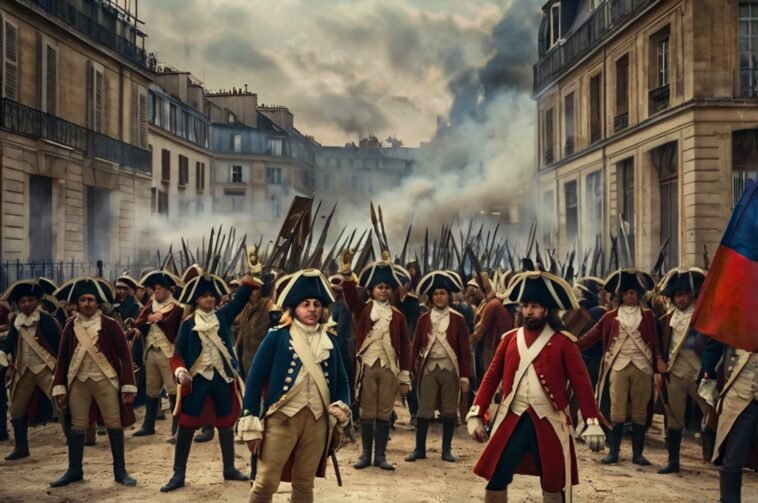
The 18th century was a time of monumental change, with revolutions, intellectual movements, and global power struggles reshaping the world.
The period between 1700 and 1800 saw the rise of new ideas, political shifts, and significant advancements in science and industry.
From the American and French Revolutions to the start of the Industrial Revolution, this century laid the foundation for the modern world.
In this blog, we’ll explore the most critical historical events of the 18th century and their lasting impact on global history.
Major Historical Events of the 18th Century
The 18th century wasn’t just marked by war and revolution.
It was a period of enlightenment, industrial growth, and cultural transformation.
Let’s dive into the key events that shaped this era.
The French revolution (1789-1799)
The French Revolution was a major political upheaval that transformed France’s government.
It began as a popular revolt against the monarchy and aristocracy, driven by financial crisis, widespread hunger, and dissatisfaction with King Louis XVI.
The revolution aimed to end the monarchy, promote equality, and reduce the power of the Catholic Church.
Key figures like Maximilien Robespierre and Napoleon Bonaparte emerged, shaping the nation’s future.
Although the revolution ended with Napoleon declaring himself Emperor, its ideals of liberty, equality, and fraternity continued to influence the world.
American revolution (1775-1783)
The American Revolution was a pivotal event in which the 13 American colonies fought against British rule.
Frustrated by taxation without representation, the colonies declared independence in 1776, leading to the creation of the United States.
The war ended in 1783 with the Treaty of Paris, inspiring other nations to pursue freedom and emphasizing the importance of individual rights and democracy.
Industrial revolution
The Industrial Revolution, beginning in the late 18th century, transformed economies from agriculture-based to industry-driven.
New machinery and mass production techniques, such as James Watt’s steam engine, revolutionized industries like textiles and transportation.
Britain led this change, which quickly spread to other parts of Europe and the Americas, leading to rapid urbanization and the rise of the middle class.

Enlightenment movement
The Enlightenment was an influential intellectual movement in the 18th century that emphasized reason, science, and individual rights.
Key thinkers like Voltaire, John Locke, and Jean-Jacques Rousseau challenged traditional authority and advocated for new ideas about governance and human rights.
Their work played a crucial role in shaping both the American and French Revolutions, and their ideas laid the groundwork for modern democracy and advancements in science and education.
Seven Years’ War (1756-1763)
The Seven Years’ War was a major global conflict that involved major European powers such as Britain, France, and Spain.
The war spanned across five continents and significantly altered the colonial landscape.
It ended with Britain emerging as the leading global power, while France faced substantial losses, especially in North America.
The financial burden from this war was a contributing factor to the French Revolution, as France struggled with economic challenges and unrest.
British East India Company’s Expansion
In the 18th century, the British East India Company significantly expanded its control over India.
By increasing its economic and military influence, the company reshaped trade routes and political alliances across the Indian subcontinent.
As the century progressed, the British government began to take more direct control, leading to the full colonization of India, which continued until the mid-20th century.
Slavery Abolition Movement
The movement to end slavery gained strength in the late 18th century, especially in Britain and the American colonies.
Key figures like Thomas Clarkson and William Wilberforce were instrumental in advocating for the end of the transatlantic slave trade.
In 1807, the British Parliament passed the Abolition of the Slave Trade Act, marking a significant step in the global effort to end slavery.

Regional Conflicts and Power Struggles
Several regions experienced significant conflicts and changes throughout the 18th century.
France’s turmoil
Beyond the French Revolution, France faced ongoing internal strife during the 18th century.
Tensions between the monarchy and the people grew as the French economy suffered from debts incurred during wars like the Seven Years’ War and support for the American Revolution.
These financial troubles widened the gap between the wealthy and the poor, fueling unrest.
British issues
While Britain gained global power through victories in the Seven Years’ War and expanded its empire, it also faced challenges at home.
The loss of the American colonies during the American Revolution was a major setback, prompting changes in British colonial policies and leading to adjustments in their global strategy.
Haitian revolution (1791-1804)
The Haitian Revolution was a groundbreaking event as it marked the first successful slave revolt.
Led by Toussaint L’Ouverture, enslaved Africans fought against French colonial rule and, after years of intense conflict, established Haiti as the first independent black republic.
This revolution was a powerful statement against slavery and colonialism.
Napoleonic wars (1803-1815)
The Napoleonic Wars, which extended into the early 19th century, were deeply rooted in the aftermath of the French Revolution.
Napoleon Bonaparte aimed to expand French influence across Europe, leading to a series of conflicts involving many European nations.
His defeat at the Battle of Waterloo in 1815 ended the Napoleonic era, but the impact on European politics was profound and lasting.

Cultural and Social Transformations
The 18th century wasn’t just about political and military upheavals—it was also a time of rich cultural change, with new art, fashion, and literature emerging across Europe.
Fashion and art
Rococo style
At the start of the 18th century, Rococo became a popular art and design style in Europe.
This style is known for its elaborate and whimsical features, which were a departure from the more serious and grand Baroque style that preceded it.
Rococo art and architecture emphasized lightness, elegance, and a playful, often ornate aesthetic.
It was characterized by intricate patterns, pastel colors, and a sense of carefree joy.
Classical style
As the century progressed, the Classical style began to gain prominence.
This style was inspired by the art and architecture of ancient Greece and Rome. It focused on simplicity, balance, and harmony.
The Classical style reflected the Enlightenment ideals of reason and order, featuring clean lines, symmetrical forms, and an emphasis on rational design.
It was a reaction against the complexity and opulence of Rococo, promoting a more straightforward and disciplined approach to art and architecture.
Literary and philosophical movements
Romanticism
By the end of the 18th century, Romanticism started to take hold.
This movement was all about celebrating emotions, nature, and the individual experience.
Romanticism was a reaction against the Enlightenment’s focus on reason and logic.
Instead, it emphasized personal feelings, the beauty of nature, and the importance of individual expression.
Romantic literature and art often explored themes of passion, imagination, and the sublime, and it would go on to dominate much of the 19th century.
Philosophical debates
The Enlightenment era sparked significant philosophical debates about human rights, governance, and individual freedom.
Thinkers like Immanuel Kant and Jean-Jacques Rousseau were central to these discussions.
Kant explored ideas about morality and autonomy, while Rousseau challenged traditional views on democracy and social contracts.
These debates had a profound influence on modern political theory and philosophy, shaping contemporary ideas about personal rights and government structure.

Final Thoughts
The 18th century was a time of significant transformation.
It was an era marked by major revolutions, groundbreaking ideas, and the beginnings of industrial change.
The political and social shifts of this century helped shape the modern world, laying the groundwork for the values of liberty, democracy, and human rights that are still important today.



